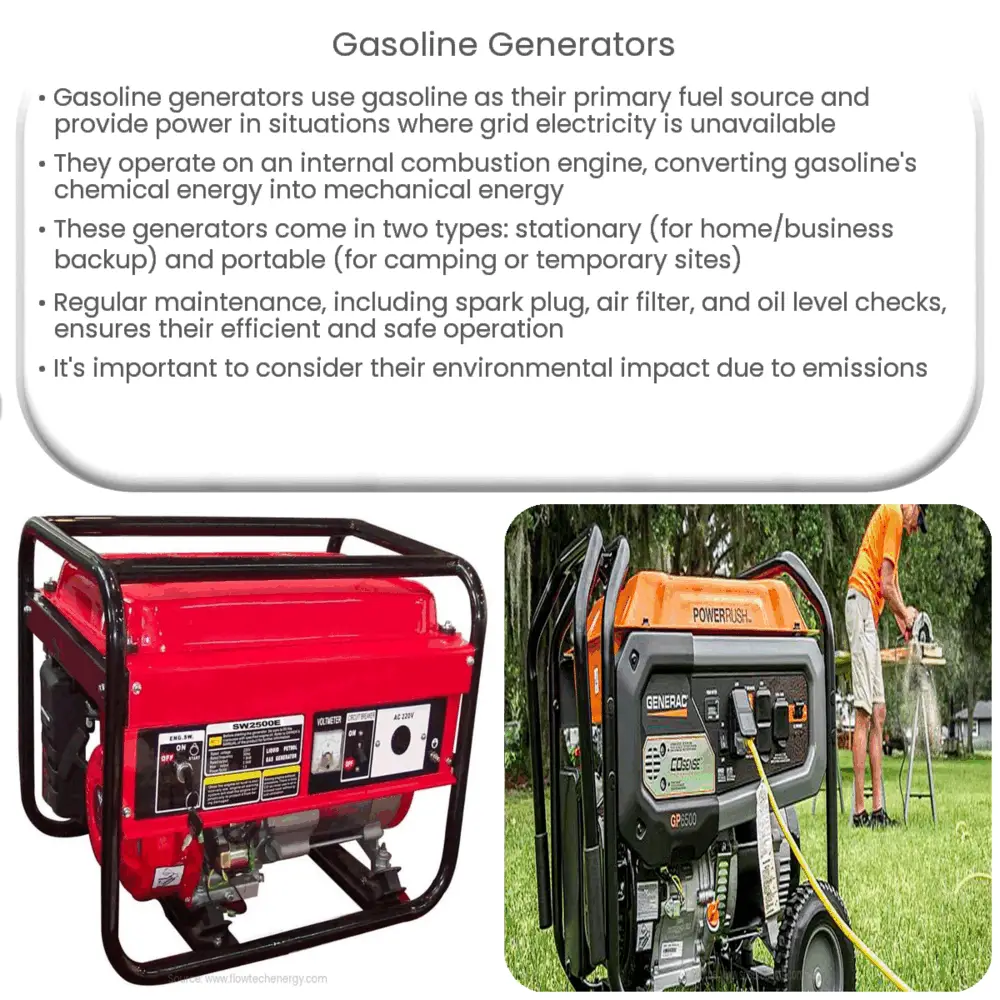Explore the working principle, types, and maintenance of gasoline generators, along with their power output and environmental impact.

Introduction to Gasoline Generators
Gasoline generators, as the name implies, are generators that use gasoline as their primary fuel source. These powerful machines are used across the world, providing electrical power in a variety of situations where grid power may be unavailable or insufficient. From natural disasters to construction sites, camping trips to home power backups, gasoline generators offer a reliable source of power.
The Working Principle of Gasoline Generators
A gasoline generator is fundamentally an internal combustion engine. The engine works by converting the chemical energy stored in gasoline into mechanical energy. This mechanical energy then drives an alternator that produces electricity. The operation of a gasoline generator can be divided into three phases: intake, compression, and ignition.
- Intake: During the intake phase, a mixture of gasoline and air is drawn into the engine’s cylinder.
- Compression: The piston within the cylinder moves upwards, compressing the fuel-air mixture and heating it up.
- Ignition: A spark from the spark plug ignites the compressed and heated fuel-air mixture, causing it to explode. This explosion pushes the piston downwards, creating the mechanical energy that drives the alternator.
Types of Gasoline Generators
Gasoline generators are categorized into two main types based on their design: stationary and portable.
- Stationary Generators: Also known as standby generators, these are designed to provide power backup for homes and businesses. They are typically large, heavy, and installed in a permanent location. Stationary generators can automatically start when a power outage occurs and continue providing power for extended periods.
- Portable Generators: These generators are smaller and lightweight, making them ideal for camping, tailgating, and construction sites. Portable generators must be manually started and can provide power for a limited period before needing to be refueled.
Power Output of Gasoline Generators
The power output of gasoline generators is measured in watts, with models ranging from a few hundred watts to several thousand. The power requirement of your application will determine the best gasoline generator to choose. For instance, a small portable generator may suffice for a camping trip, while a larger stationary generator might be necessary for a commercial building.
Fuel Efficiency and Emissions
Gasoline generators have varying levels of fuel efficiency. Factors that influence this include the generator’s design, load capacity, and how well it’s maintained. However, it is crucial to note that gasoline generators, while effective, are not the most environmentally friendly option. They produce emissions like carbon monoxide, nitrogen oxides, and unburned hydrocarbons, which contribute to air pollution. Therefore, using them responsibly and in well-ventilated areas is essential.
Maintenance of Gasoline Generators
Regular maintenance is key to keeping a gasoline generator running efficiently and safely. This can involve regular checks of the spark plug, air filter, and oil level. Furthermore, since gasoline can degrade over time, it’s recommended to use fuel stabilizers if the generator isn’t used frequently.
- Spark Plug: The spark plug should be inspected and cleaned regularly. If it’s worn out or damaged, it needs to be replaced.
- Air Filter: A clean air filter ensures that the generator runs smoothly. Therefore, it should be checked and cleaned at regular intervals.
- Oil Level: Regular checks of the oil level are critical for the generator’s performance and longevity. Low oil levels can cause the engine to seize and fail.
Conclusion
In conclusion, gasoline generators offer a versatile and practical solution for temporary power supply needs, both in residential and commercial applications. Understanding their working principle, the types available, and how to maintain them can help users optimize their use and prolong their lifespan. However, while they offer many advantages, it’s crucial to remember their environmental impact. Therefore, users must take necessary precautions to minimize emissions and consider alternatives where possible, such as solar or battery-powered generators.

